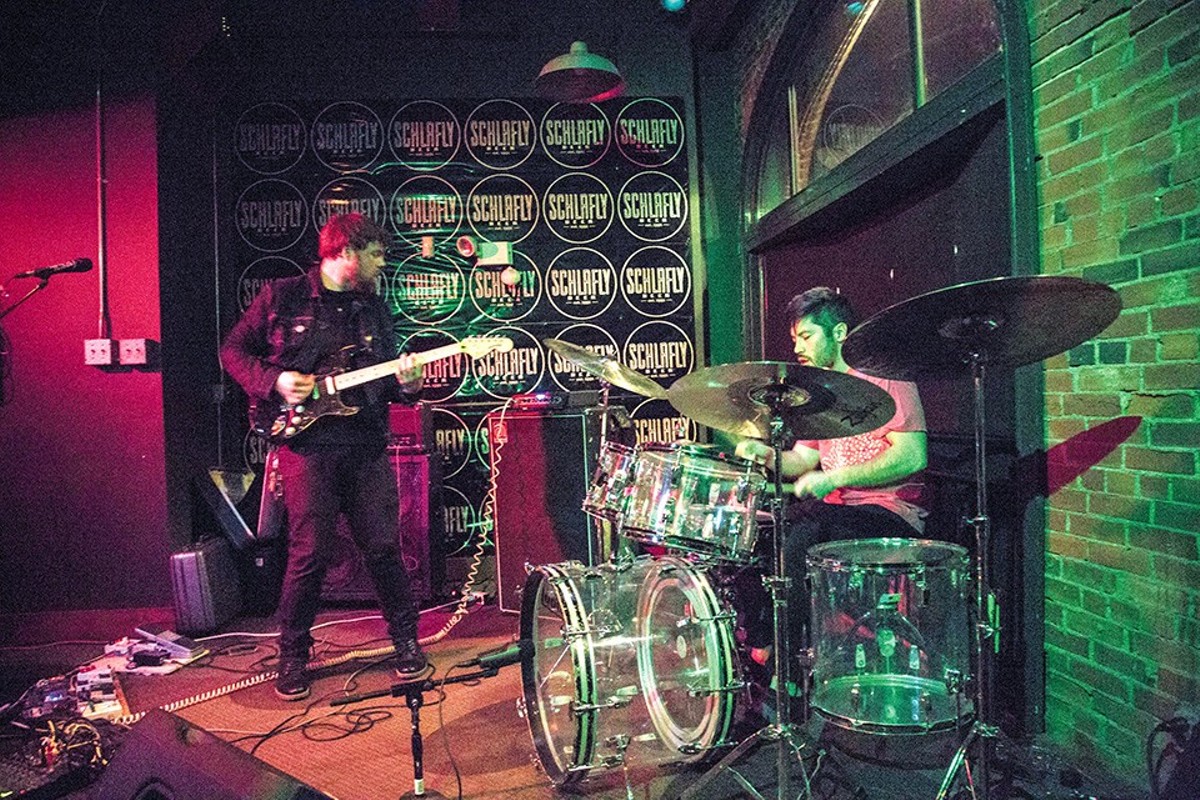When Dave Todd fronted Popular Mechanics, a respected but below-the-radar rock quartet, he sharpened his knack for writing three-minute songs that merged classic rock and pop hooks with Todd's oft-sardonic commentary. After that band parted ways a few years ago, he and drummer Sean Wilke wanted to keep working together, but they were tired of conventional verse-chorus-verse rock songs.
Todd and Wilke's new project, Subtropolis, takes the idea of the well-made rock track and turns it to shrapnel. Across five songs on its debut Automatic Touchless, the duo hides snippets of songs like Easter eggs in the tall grass of prog-like song suites. You might hear something that sounds like a Kinks cut or a dream-pop track, but chances are you won't hear it for long.
For Todd, Subtropolis has its roots in his old band, but he treats the new project as a conscious shift. "Popular Mechanics sort of ran out of steam creatively — it was time to change, and I had been writing a lot of stuff that was all over the place," says Todd. "Sean was our drummer for the last year of the band and he was much different than our last drummer, and it opened up a lot of what we could do with the band."
Wilke's time in that group was brief — he contributed to a two-song single released just before Popular Mechanics split up — but it was enough time for him to inhabit an already-warm drum stool while still making his own imprint.
"When I first joined Popular Mechanics, it was more like drum karaoke," Wilke recalls. "I joined the band about a year before we broke up, and my job at that point was to learn the parts. As we were playing more and more and starting to create with me involved, I started getting more comfortable doing different things. Historically, I have enjoyed doing different time signatures while keeping a good groove."
Much of the material on Automatic feels like rock & roll splatter-paint on first listen, but it doesn't take long for the discipline and dexterity of both instrumentalists to reveal themselves.
"Sean thinks about it a lot — he is very deliberate," Todd says of Wilke's parts. "We used to do a lot of bash-'em-out songs, and Sean would think about the parts he was playing. He had a very different feel, a very different sense of timing and a different pocket rhythmically. It was like, wow, we could use this."
Wilke's rhythmic dexterity is the prime mover in Subtropolis, which relies on the shifting tides of math rock to disrupt Todd's already-flurried songs, most of which branch off into a few different stylistic directions before the run time is up. On Automatic Touchless, Subtropolis leans into some mechanical, pneumatically precise riffs and hairpin rhythmic shifts, but much of the joy comes from the whipsaw approach to mashing songs and styles into something both coherent and askew.
"I had definitely been in bands that fell under the the umbrella of math rock or noise rock, and definitely in the past two years I have reinvigorated my love for the classic British prog stuff like King Crimson and Genesis," Todd says. But while prog rock often involves a cast of musicians creating knotty tapestries with layered guitars and banks of synthesizers, Subtropolis' two-man approach won't immediately call to mind the work of Yes.
Todd notes that in Popular Mechanics, he was frequently arriving to rehearsals with pre-written songs. In Subtropolis, he remains the frontman and lead singer, but the songs spring from the interplay between him and Wilke, and several songs emanate from one-off goofs during rehearsal.
"This is probably a more collaborative type of thing," Todd says. "A lot of these stem from jams in the room."
For Wilke, the song that most clearly suggested that this two-piece group would work came through the track "Plastic Sheet." The track opens with his most scattershot drum fill — it sounds as if he has dared himself to hit every piece of his kit in the shortest time possible — before Todd enters with a lurching sequence that eventually straightens into a Brit-pop chorus and a thumping, flanger-heavy series of repetitive riffs.
"The main groove came out of me messing around," Wilke says of the song. "I essentially just modified a Captain Beefheart beat. That was the first time we had a non-linear song."
Subtropolis has played about once a month during its year and a half in existence, including a release show at Foam at the end of last month.
"I'm not sure if people who liked the old band dislike the new band, but there are definitely people who disliked the old band that like the new one," says Todd. That type of response is fine with him and Wilke, who are more than content chasing their own muse as a two-headed math-prog hybrid beast.
"I feel like we get a strong reaction either way — they either like us or they leave the room, and I'm OK with that," says Wilke.






